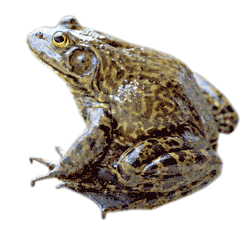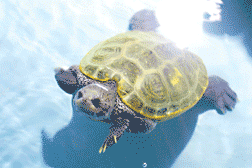|
|||||||||
|
|||||||||
|
|||||||||
Reptile RulesNew state regulations protect creatures that hop, crawl and slitherby Carrie Madren, Bay Weekly staff writer
Host a copperhead snake as a pet in Maryland, and you’ll soon be an outlaw. That’s because new rules will govern the capture and possession of reptiles and amphibians after March. Nearly a dozen changed regulations will affect Maryland turtle keeping or frog leg eating. Most new rules will simply get our Maryland Register code up to date with new laws. Other changes will protect diminishing species losing their homes. The poisonous copperhead and Eastern mud salamander will join the list of protected species — a handful of sea turtles, rare salamanders, snakes and frogs — that cannot be captured, bred or sold in the state. Copperhead snakes get banned from our living spaces not to protect the snakes but to bring Department of Natural Resources regulations up to speed on laws passed by the General Assembly. Last year, legislators changed the law on harboring dangerous animals to ban possession of poisonous snakes. That’s stricter than the current law, which only bans importing the venomous serpents. The Eastern mud salamander, a rare native species, gets protection for its own sake. “These salamanders are likely declining in range,” says Glenn Therres, of the department’s Wildlife and Heritage Service. “It’s not a popular species as a pet, so there will probably be no ramifications.” French chefs and 10-year-old boys will mourn one cutback: New regulations allow you no more than 10 wild American bullfrogs for food or pets. Bullfrogs weren’t previously on the list of regulated species. “Bullfrogs are native, but they have flourished by human releases,” says Therres. “There’s a food market for bullfrogs. We’re trying to regulate all species, so we added bullfrogs and made provisions for food. We’re not trying to regulate the food industry but to curtail exploiting the native population.” So you can’t set up shop as a frog-leg distributor. The legs you might find at markets may hail from Louisiana, which raises bullfrogs for food. New to the state conservation list are six aquatic turtles: the eastern painted turtle, the midland painted turtle, the eastern mud turtle, the northern red-bellied cooter, the stinkpot and the diamondback terrapin. Turtle enthusiasts can have up to one adult turtle without a $25 permit and more with the permit. If you’re already keeping more than one native turtle, you must apply for a grandfathering permit with DNR by March 31. If you want your turtles to propagate, you’ll also need a breeding permit. “A few years ago the General Assembly was petitioned by herpetology folks to allow for breeding of turtles,” Therres says. The Health Department had previously limited breeding for fear of spreading salmonella, he explained, until lawmakers passed a law allowing turtle breeding with a permit. “DNR was always in support of captive breeding, which provides turtles for hobbyists and pets,” says Therres. If you don’t breed the turtles yourself — with a permit — you must buy them from out of state. Currently, any turtle that you sell must have a carapace length of at least four inches. That law got a Towson couple in trouble on Jan. 31. Maryland Natural Resources Police busted them for selling undersized juvenile red-eared slider turtles through an Internet advertisement. The couple had originally purchased 300 turtles and had sold all but 27 of them from their apartment. For their reptilian folly, the sellers were each issued a citation; if found guilty, they’ll face a maximum penalty of $500 and/or one-year imprisonment. New changes in the law include allowing us to buy and sell baby turtles — less than four inches produced in captivity, with a permit — outside of Maryland. “We don’t have a problem with turtles in the pet trade, but we’re encouraging that they come from captivity, so there’s less pressure on wild populations and they can be sustained,” he says. Terrapin champion Marguerite Whilden insists it’s a bad idea to allow people to breed and keep terrapins as pets. “Now we’re going to give to someone else the chance to commercialize these turtles,” says Whilden, terrapin teacher and advocate. “Do we still need to be exploiting wildlife?”
Keeping Wild Terrapins WildThe new herp laws will be a good, albeit miniscule, step for our state reptile. When new regulations pass, Marylanders — even with a permit — can’t take wood turtles, spotted turtles or diamondback terrapins, our state reptile, from the wild. “You can still legally acquire them from captive breeding programs,” Therres says, with a permit. After the legislators passed the ban on commercial terrapin harvesting, DNR banned all catching in the wild. The department also shifted terrapin regulations from its fisheries office to Wildlife and Heritage. Even so, the there’s by-catch — or accidental trapping — of terrapins in crabpots that remains a problem, according to Whilden, who says her next focus is getting more habitat back for the state turtle. That’s a concern at DNR, too. “The problem with all turtles is that population decreases primarily with reduction of adults in population,” Therres says. Add a shrinking adult population to disappearing sandy shorelines and turtle habitat, and we have a recipe for species trouble. The state of our terrapins remains an educated guess at best. Terrapins are still so understudied that scientists don’t know how many thrive in the Chesapeake. Laws will officially change when published in March in the Maryland Register. See the complete list of changes to reptile and amphibian laws at www.dnr.state.md.us/wildlife/proposedcaptive.asp. |
|||||||||
|
|||||||||
|
|
|||||||||
|
© COPYRIGHT 2008 by New Bay Enterprises, Inc. All rights reserved. |
|||||||||



